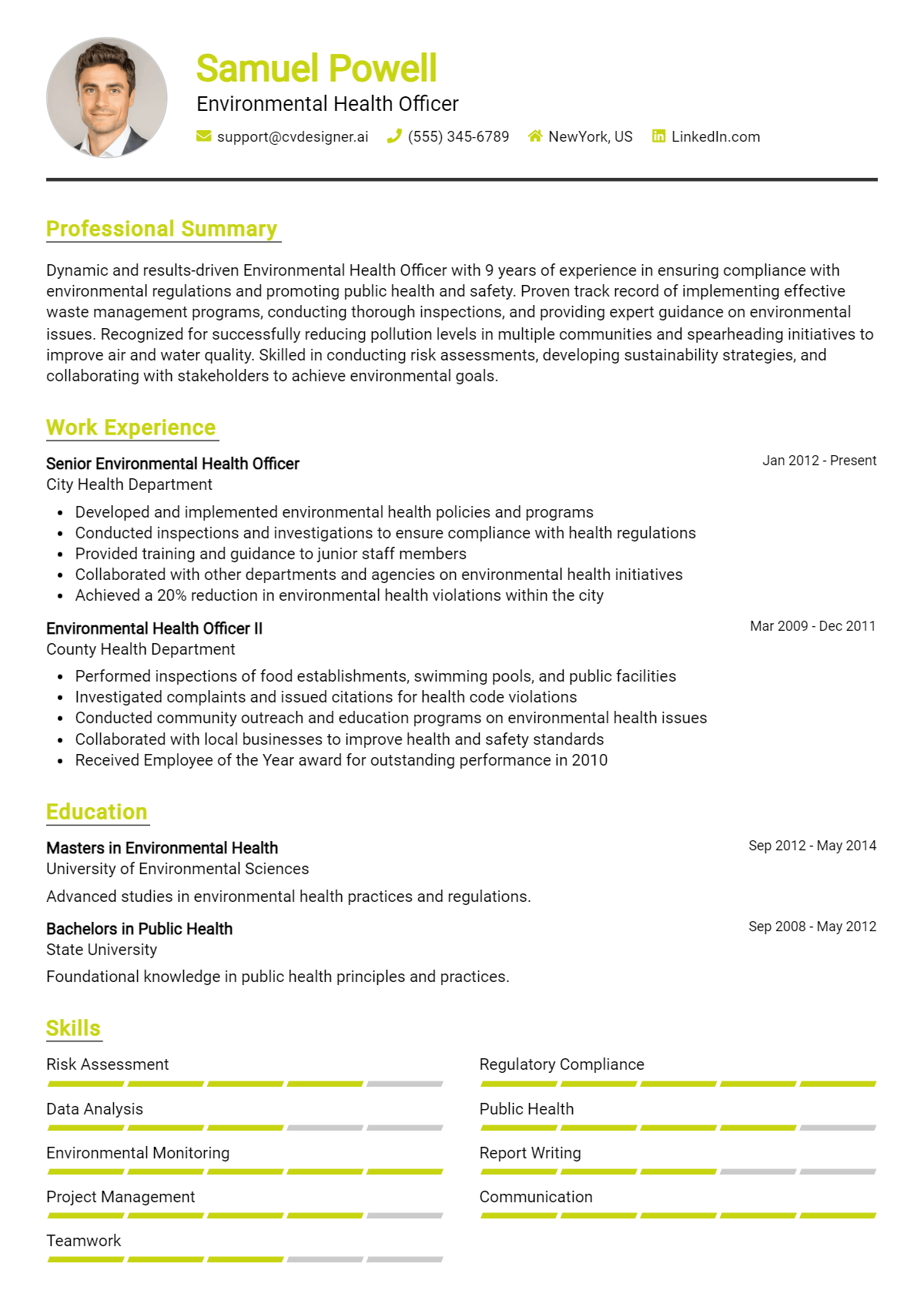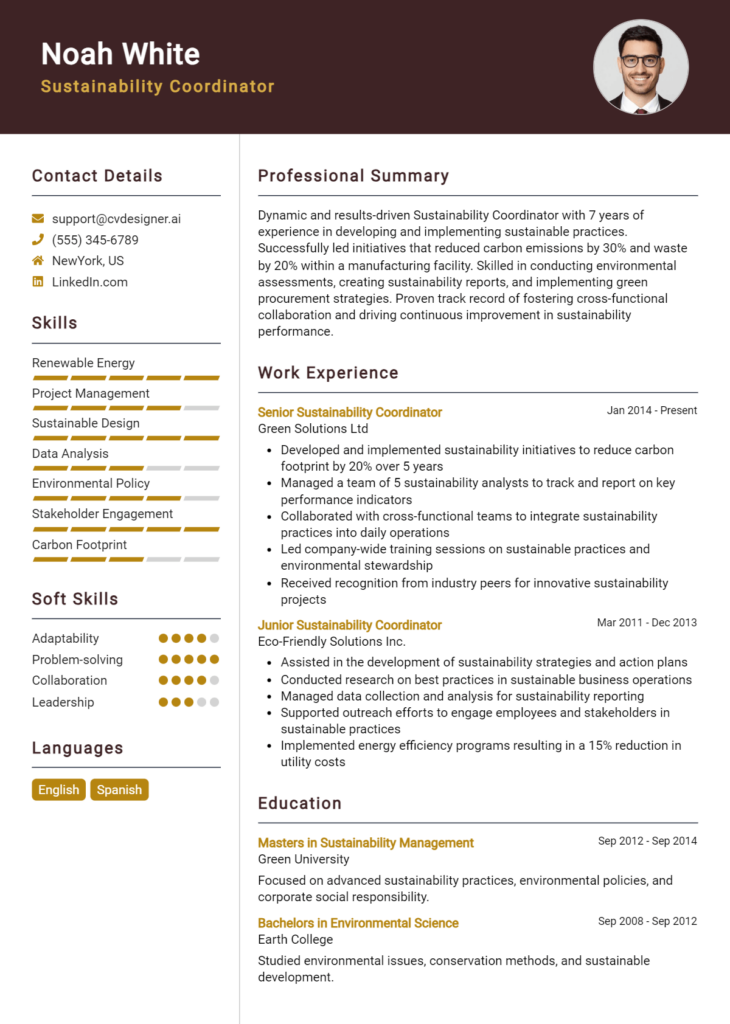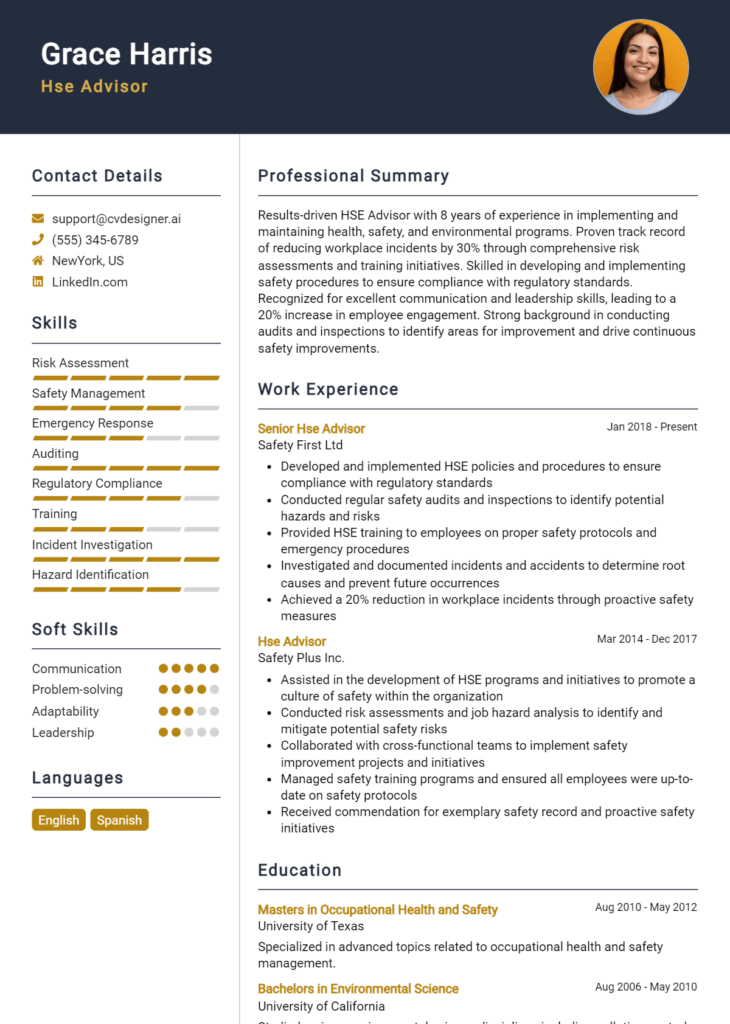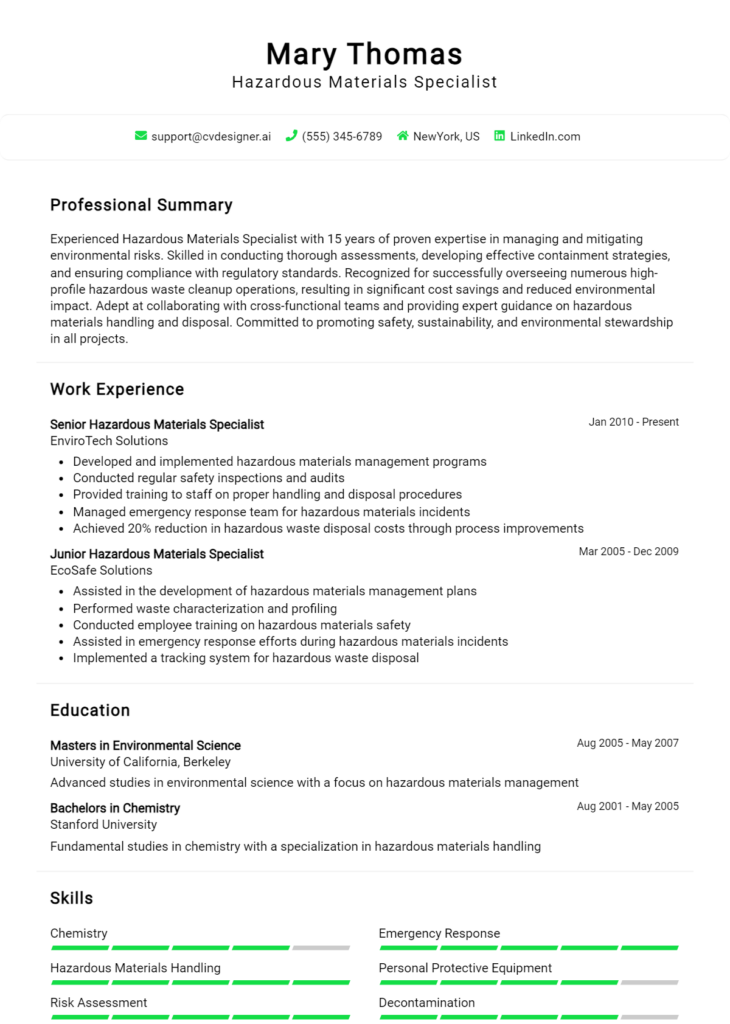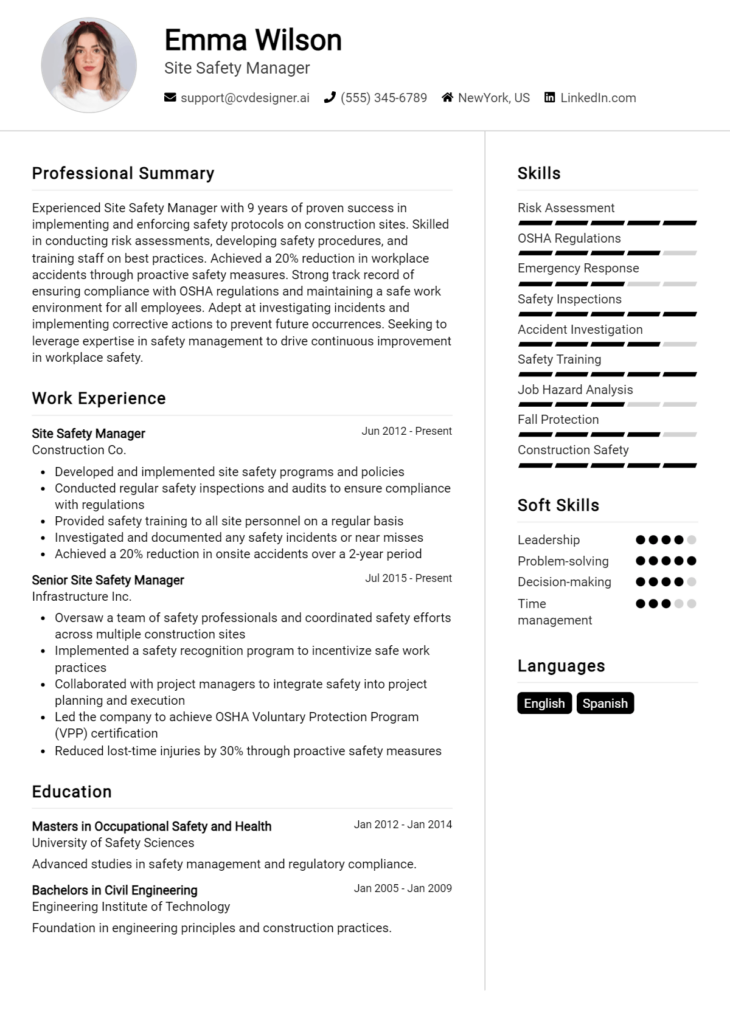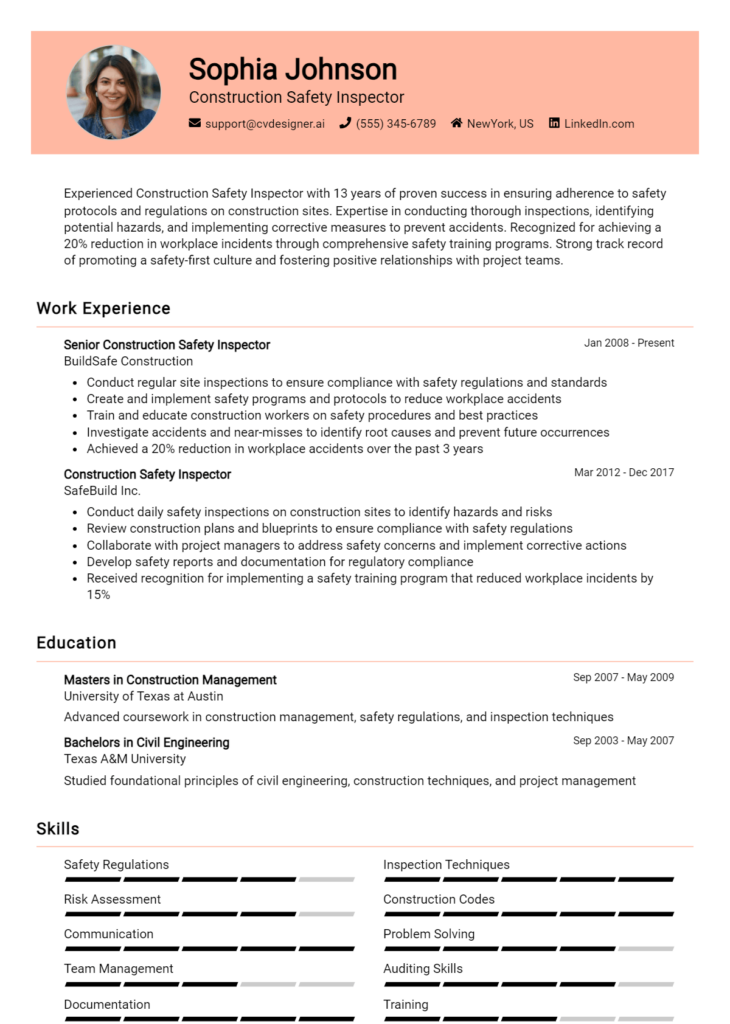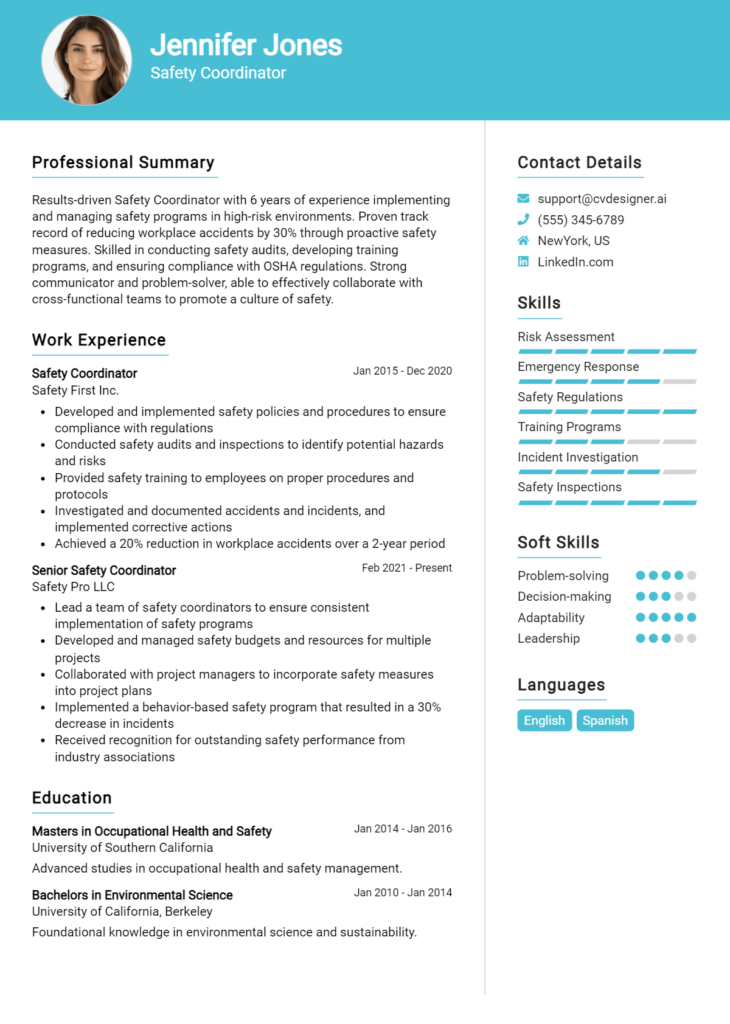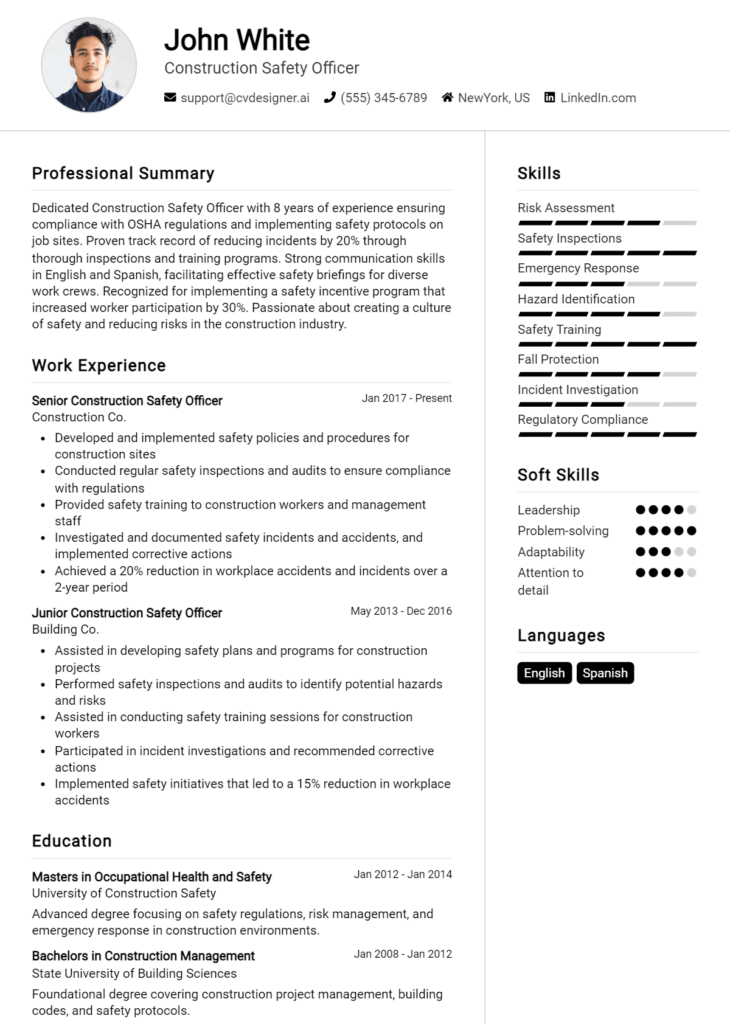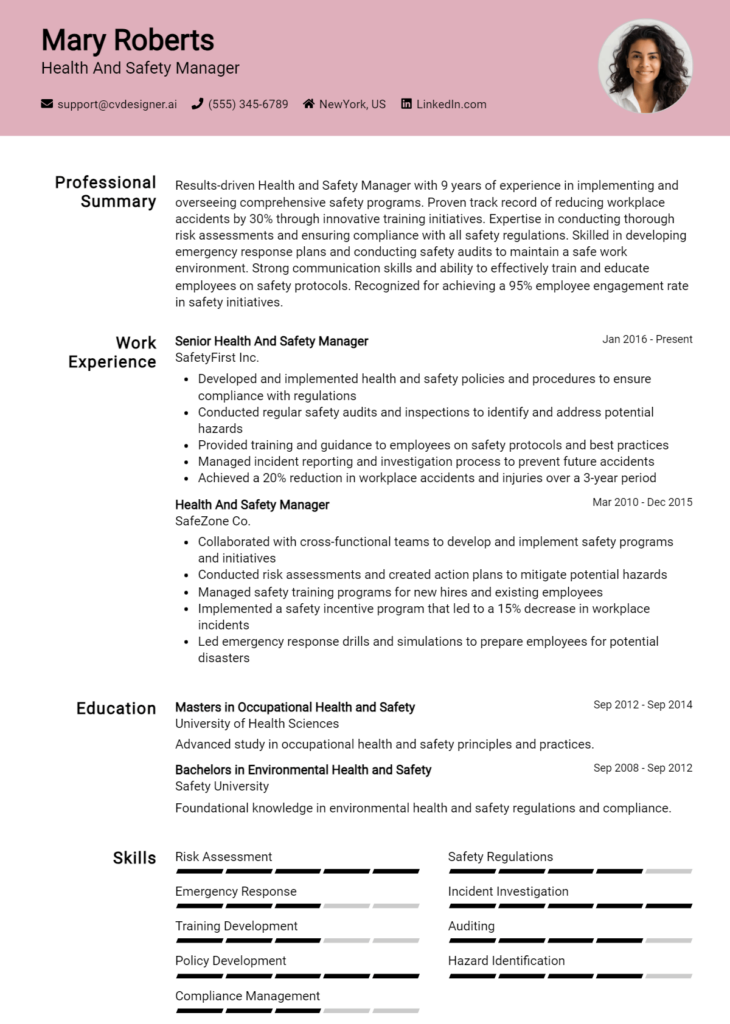Environmental Health Officer Core Responsibilities
An Environmental Health Officer plays a crucial role in safeguarding public health by monitoring environmental conditions, enforcing health regulations, and conducting inspections. This position requires technical expertise in environmental science, excellent problem-solving skills, and operational efficiency to effectively collaborate with various departments, including public health, urban planning, and regulatory agencies. By leveraging these skills, Environmental Health Officers contribute significantly to organizational goals, ensuring community well-being. A well-structured resume can effectively highlight these qualifications, making candidates stand out in the field.
Common Responsibilities Listed on Environmental Health Officer Resume
- Conducting regular inspections of public facilities and environmental sites.
- Implementing health and safety regulations and policies.
- Investigating complaints related to environmental hazards.
- Collecting and analyzing environmental samples.
- Collaborating with local agencies and stakeholders.
- Educating the public on health and environmental issues.
- Preparing reports and maintaining accurate records.
- Monitoring compliance with health standards and regulations.
- Responding to public health emergencies and crises.
- Conducting risk assessments and developing mitigation strategies.
- Participating in community outreach and education programs.
- Staying updated on environmental legislation and best practices.
High-Level Resume Tips for Environmental Health Officer Professionals
In the competitive field of environmental health, a well-crafted resume is crucial for making a strong first impression on potential employers. Your resume is often the first glimpse hiring managers get of your professional capabilities and achievements, making it essential to ensure it effectively showcases your skills and experiences. As an Environmental Health Officer, your resume should not only highlight your qualifications but also demonstrate your commitment to public health and safety. This guide will provide practical and actionable resume tips specifically tailored for professionals in the environmental health sector, helping you stand out in a crowded job market.
Top Resume Tips for Environmental Health Officer Professionals
- Tailor your resume for each job application by aligning your skills and experiences with the specific job description.
- Highlight relevant experience in environmental health, including internships, volunteer work, or previous job roles that showcase your expertise.
- Quantify your achievements with specific metrics, such as the number of inspections conducted or improvements made in public health outcomes.
- Incorporate industry-specific keywords to optimize your resume for Applicant Tracking Systems (ATS) used by many employers.
- Showcase your educational background, including any relevant certifications or training specific to environmental health and safety.
- Include a summary statement at the top of your resume that encapsulates your professional identity and career goals.
- Demonstrate your communication skills by providing examples of reports, presentations, or community outreach efforts you’ve undertaken.
- Highlight your ability to work collaboratively with diverse stakeholders, such as government agencies, community organizations, and the public.
- Keep your resume formatting clean and professional, using bullet points for easy readability and ensuring consistency in font and style.
By implementing these tips, you can significantly enhance your resume, increasing your chances of landing a job in the Environmental Health Officer field. A well-structured and targeted resume not only emphasizes your qualifications but also reflects your dedication to promoting public health and environmental safety, making you a compelling candidate for potential employers.
Why Resume Headlines & Titles are Important for Environmental Health Officer
In the competitive field of environmental health, a well-crafted resume headline or title serves as a crucial first impression for hiring managers. For an Environmental Health Officer, a compelling headline can succinctly encapsulate their expertise, qualifications, and value proposition in one striking phrase. This brief yet powerful statement not only draws attention but also provides a summary of the candidate’s key qualifications relevant to the role. An effective resume headline should be concise, relevant, and directly related to the specific job being applied for, effectively setting the tone for the rest of the resume.
Best Practices for Crafting Resume Headlines for Environmental Health Officer
- Keep it concise—aim for one impactful phrase.
- Make it role-specific—include keywords relevant to the Environmental Health Officer position.
- Highlight key qualifications—focus on skills, certifications, or experiences that set you apart.
- Use action-oriented language—incorporate dynamic verbs to convey your contributions.
- Tailor it to the job—customize the headline for each application based on the job description.
- Include measurable achievements—if possible, quantify your impact (e.g., “Reduced pollutants by 30%”).
- Avoid jargon—ensure clarity and accessibility for all readers.
- Align with industry standards—use terminology and phrases commonly recognized in environmental health.
Example Resume Headlines for Environmental Health Officer
Strong Resume Headlines
“Certified Environmental Health Officer with 5+ Years of Experience in Hazardous Waste Management”
“Proactive Environmental Health Specialist Committed to Reducing Public Health Risks”
“Results-Driven Environmental Health Officer with Proven Track Record in Compliance and Enforcement”
“Dedicated Environmental Health Professional with Expertise in Air and Water Quality Management”
Weak Resume Headlines
“Looking for a Job in Environmental Health”
“Environmental Health Officer”
“Experienced Professional”
Strong headlines are effective because they immediately communicate the candidate's expertise and relevant achievements, making it easy for hiring managers to see the value they bring to the table. In contrast, weak headlines tend to be vague or generic, failing to capture attention or convey specific qualifications. By using precise language and highlighting relevant experience, strong headlines can significantly enhance a candidate's chances of making a lasting impression.
Writing an Exceptional Environmental Health Officer Resume Summary
A well-crafted resume summary is essential for an Environmental Health Officer as it serves as the candidate's first impression on hiring managers. A strong summary quickly captures attention by succinctly showcasing key skills, relevant experience, and noteworthy accomplishments that align with the responsibilities of the role. This brief yet impactful section not only highlights the candidate's qualifications but also sets the tone for the rest of the resume. Tailoring the summary to the specific job being applied for can significantly enhance the candidate's chances of making a lasting impression in a competitive job market.
Best Practices for Writing a Environmental Health Officer Resume Summary
- Be concise: Aim for 2-4 sentences that clearly outline your qualifications.
- Quantify achievements: Use numbers to demonstrate the impact of your work, such as the percentage of compliance achieved.
- Focus on relevant skills: Highlight specific skills that are crucial for the Environmental Health Officer role.
- Tailor for the job description: Align your summary with the key responsibilities and qualifications outlined in the job posting.
- Use strong action verbs: Start sentences with powerful verbs to convey confidence and decisiveness.
- Showcase problem-solving abilities: Mention instances where you successfully addressed environmental health challenges.
- Include certifications or relevant education: If applicable, briefly mention any certifications or degrees that enhance your qualifications.
- Maintain a professional tone: Ensure that the language used is formal yet approachable, reflecting the seriousness of the role.
Example Environmental Health Officer Resume Summaries
Strong Resume Summaries
Detail-oriented Environmental Health Officer with over 5 years of experience in enforcing health regulations and conducting inspections, resulting in a 30% increase in compliance rates across multiple jurisdictions.
Dedicated professional with a Master’s degree in Environmental Science and proven expertise in hazard assessments; successfully reduced environmental risks by implementing strategic interventions that improved public health outcomes by 25%.
Results-driven Environmental Health Officer with a track record of collaborating with local agencies to develop sustainable health policies, leading to the establishment of three new community health initiatives in under two years.
Weak Resume Summaries
Environmental Health Officer with some experience in inspections and regulations. I am looking for a job where I can utilize my skills.
Hardworking individual with a background in environmental health seeking to contribute my skills in a challenging position.
The strong resume summaries are effective because they provide specific examples of accomplishments and quantify results, demonstrating a clear impact in previous roles. They also mention relevant skills and education that align with the job, making them tailored and compelling. In contrast, the weak summaries lack detail and quantifiable achievements, making them generic and unmemorable, which can hinder the candidate's chances of attracting attention from hiring managers.
Work Experience Section for Environmental Health Officer Resume
The work experience section of an Environmental Health Officer resume is pivotal as it effectively showcases the candidate's technical skills, ability to manage teams, and capacity to deliver high-quality outcomes. This section not only highlights relevant job roles and responsibilities but also emphasizes quantifiable achievements that demonstrate the candidate's impact in previous positions. Aligning these experiences with industry standards is crucial for illustrating the candidate's proficiency in environmental health practices and regulatory compliance, making this section a key component in capturing the attention of potential employers.
Best Practices for Environmental Health Officer Work Experience
- Highlight specific technical skills relevant to environmental health, such as risk assessment and contamination control.
- Use quantifiable metrics to demonstrate the impact of your work, such as percentage reductions in violations or improvements in compliance rates.
- Showcase leadership abilities by detailing experiences managing teams or projects and achieving collective goals.
- Align your experiences with industry standards by referencing relevant regulations and best practices in environmental health.
- Include collaborative efforts with other departments or agencies to illustrate teamwork and communication skills.
- Focus on outcomes and results rather than just tasks to provide a clearer picture of your contributions.
- Tailor the work experience section to the job description to highlight the most relevant experiences.
- Use action verbs to convey your role in each experience clearly and dynamically.
Example Work Experiences for Environmental Health Officer
Strong Experiences
- Led a team of 5 in conducting over 200 environmental inspections, resulting in a 30% decrease in health code violations year-over-year.
- Implemented a community outreach program that educated over 1,000 residents on safe waste disposal practices, resulting in a 50% increase in compliance.
- Collaborated with local agencies to develop a multi-sector response plan for hazardous material spills, enhancing emergency response times by 40%.
Weak Experiences
- Assisted with various inspections and compliance checks.
- Worked on a team to address environmental issues.
- Helped with community education efforts.
The examples of strong experiences are considered effective because they provide specific, quantifiable outcomes that demonstrate the candidate’s significant contributions and leadership abilities. Each statement clearly articulates the impact of their work and aligns with industry standards. In contrast, the weak experiences lack detail and specificity, failing to communicate clear achievements or responsibilities, making them less impactful in showcasing the candidate's qualifications.
Education and Certifications Section for Environmental Health Officer Resume
The education and certifications section of an Environmental Health Officer resume plays a pivotal role in demonstrating a candidate's qualifications and expertise in the field. This section not only showcases the academic background of the applicant but also highlights relevant industry certifications and ongoing professional development efforts. By including pertinent coursework, specialized training, and recognized credentials, candidates can significantly enhance their credibility and demonstrate their alignment with the requirements of the job role. This emphasis on education and certifications signals to employers that the candidate is not only knowledgeable but also committed to maintaining current standards and practices in environmental health.
Best Practices for Environmental Health Officer Education and Certifications
- Tailor the education and certifications section to match the specific job requirements and responsibilities outlined in the job description.
- Include relevant degrees from accredited institutions, such as a Bachelor’s or Master’s in Environmental Health, Public Health, or a related field.
- Highlight industry-recognized certifications, such as Registered Environmental Health Specialist (REHS) or Certified Professional in Erosion and Sediment Control (CPESC).
- List any relevant coursework that directly pertains to environmental health issues, including toxicology, epidemiology, or environmental policy.
- Incorporate ongoing education efforts, such as workshops, seminars, or online courses focused on emerging trends in environmental health.
- Use clear and concise language, avoiding overly technical jargon that may not be familiar to all hiring managers.
- Ensure that all listed qualifications are current and valid, providing renewal dates where applicable.
- Consider including honors or distinctions received during academic pursuits to further enhance credibility.
Example Education and Certifications for Environmental Health Officer
Strong Examples
- Bachelor of Science in Environmental Health, University of California, 2020
- Registered Environmental Health Specialist (REHS), National Environmental Health Association, 2021
- Coursework in Toxicology and Environmental Risk Assessment, completed 2019
- Certification in Food Safety Management, American National Standards Institute, 2022
Weak Examples
- Bachelor of Arts in History, University of XYZ, 2010
- Certification in Basic Life Support (BLS), American Heart Association, 2015
- Completed a course in Creative Writing, 2020
- High School Diploma, 2005
The strong examples are considered relevant because they directly align with the qualifications and skills needed for an Environmental Health Officer role, showcasing both educational attainment and recognized credentials in the field. In contrast, the weak examples are deemed irrelevant because they do not pertain to environmental health or public health practices, indicating a lack of focus on the necessary competencies for the position.
Top Skills & Keywords for Environmental Health Officer Resume
As an Environmental Health Officer, having a well-crafted resume that highlights both hard and soft skills is crucial in showcasing your qualifications and suitability for the role. Employers in this field seek candidates who possess a balanced mix of technical expertise and interpersonal abilities, as the job often requires collaboration with various stakeholders, including government agencies, community members, and other professionals. A strong emphasis on skills not only demonstrates your capability to handle the responsibilities associated with environmental health but also reflects your commitment to making a positive impact on community welfare. By effectively presenting your skills, you can significantly enhance your chances of standing out in a competitive job market.
Top Hard & Soft Skills for Environmental Health Officer
Soft Skills
- Strong communication skills
- Team collaboration
- Critical thinking
- Problem-solving abilities
- Attention to detail
- Leadership qualities
- Adaptability
- Time management
- Public speaking
- Empathy and cultural sensitivity
- Negotiation skills
- Conflict resolution
- Networking abilities
- Decision-making
Hard Skills
- Knowledge of environmental regulations
- Proficiency in data analysis
- Familiarity with health and safety standards
- Geographic Information Systems (GIS) expertise
- Environmental risk assessment
- Experience with laboratory testing procedures
- Hazardous materials management
- Environmental sampling techniques
- Report writing and documentation
- Policy development and implementation
- Statistical software proficiency
- Emergency response planning
- Field investigation techniques
- Knowledge of sanitation practices
Incorporating these skills into your resume, alongside relevant work experience, will help create a compelling narrative of your qualifications as an Environmental Health Officer.
Stand Out with a Winning Environmental Health Officer Cover Letter
Dear [Hiring Manager's Name],
I am writing to express my interest in the Environmental Health Officer position at [Company/Organization Name], as advertised on [where you found the job listing]. With a strong academic background in environmental science and over [X years] of hands-on experience in public health and environmental management, I am confident in my ability to contribute effectively to your team. My passion for promoting healthy environments and ensuring compliance with health regulations aligns perfectly with [Company/Organization Name]'s mission to enhance community well-being.
In my previous role at [Previous Employer], I successfully conducted numerous inspections and assessments to evaluate environmental hazards and enforce health regulations. I developed comprehensive reports that not only highlighted compliance issues but also provided actionable recommendations for improvement. My ability to communicate complex scientific information to diverse audiences has been instrumental in fostering community engagement and promoting awareness of public health issues. I am adept at collaborating with various stakeholders, including government agencies, community organizations, and local businesses, to implement effective solutions that protect public health.
I am particularly impressed by [Company/Organization Name]'s initiatives in [mention any relevant program or project], which resonate with my commitment to sustainable practices and community health. I am eager to bring my expertise in environmental health policies, data analysis, and public education to your organization, ensuring that we continue to safeguard our community's health and well-being. Thank you for considering my application. I look forward to the opportunity to discuss how my skills and experiences can contribute to the ongoing success of [Company/Organization Name].
Sincerely,
[Your Name]
[Your Contact Information]
Common Mistakes to Avoid in a Environmental Health Officer Resume
Crafting a resume as an Environmental Health Officer requires careful attention to detail, as this role plays a crucial part in safeguarding public health and the environment. However, many candidates make common errors that can undermine their qualifications and diminish their chances of landing an interview. By being aware of these pitfalls, job seekers can create a more compelling and effective resume that truly showcases their skills and experience. Here are some common mistakes to avoid:
Vague Job Descriptions: Failing to provide specific details about previous roles can leave hiring managers unclear about your contributions and achievements. Use quantifiable metrics to demonstrate your impact.
Ignoring Relevant Skills: Not highlighting key skills relevant to environmental health, such as data analysis, risk assessment, or knowledge of regulations, can make your resume less appealing. Tailor your skills section to match the job description.
Overly Complex Language: Using jargon or overly technical language may alienate readers. Aim for clarity and simplicity to ensure your resume is easily understood by all potential employers.
Inconsistent Formatting: An unorganized or inconsistent format can distract from your qualifications. Stick to a clean, professional layout with uniform fonts and spacing for a polished appearance.
Lack of Keywords: Many employers use applicant tracking systems (ATS) to screen resumes. Failing to include relevant keywords from the job posting can result in your resume being overlooked. Be sure to integrate these keywords naturally throughout your document.
Neglecting Continuing Education: Not mentioning professional development or certifications can make you appear out of touch with industry standards. Highlight any relevant training, workshops, or certifications to demonstrate your commitment to the field.
Typos and Grammatical Errors: Simple mistakes can create a negative impression and suggest a lack of attention to detail. Proofread your resume multiple times and consider having someone else review it before submission.
Using a Generic Objective Statement: A generic objective fails to capture your specific career goals or how you can contribute to the organization. Instead, use a tailored summary statement that reflects your unique qualifications and aspirations for the role.
Conclusion
As an Environmental Health Officer, your role is crucial in safeguarding public health and ensuring compliance with environmental regulations. Throughout this article, we've discussed the essential skills required for success in this position, including knowledge of environmental laws, analytical skills, and the ability to communicate effectively with various stakeholders. It’s also important to stay updated on the latest health and environmental trends to make informed decisions.
Your resume is a vital tool that showcases your qualifications and experiences. It should reflect your expertise in conducting inspections, investigating complaints, and implementing health and safety programs. Tailoring your resume to highlight relevant skills and accomplishments will make you stand out in a competitive job market.
Now is the perfect time to review and enhance your Environmental Health Officer resume. Take advantage of the resources available to you, such as resume templates, which can help you create a professional-looking document. Utilize the resume builder for easy customization, and explore resume examples for inspiration. Don’t forget to craft a compelling cover letter with the help of cover letter templates to complement your resume.
Take action today and ensure your resume effectively communicates your qualifications and readiness for the Environmental Health Officer role.

